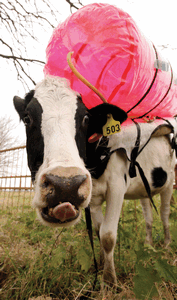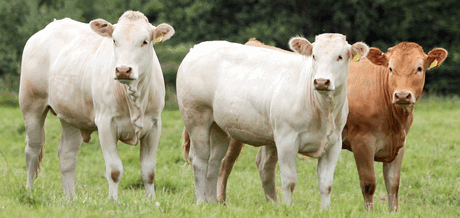No easy answers to the meatiest of questions

When a Nobel Prize winner says something controversial, people tend to sit up and take notice. And sit up they did when Rajendra Pachauri, chairman of the United Nations Intergovernmental Panel on Climate Change, spoke in London this week.
People should eat less meat, said Dr Pachauri, joint winner of the 2007 Nobel Peace Prize for his work on global warming. Livestock farming was a major source of greenhouse gas, and individuals should save the planet by transforming their diets.
“Someone will ask what they can do to fight climate change in their personal lives. You can tell them about changing light bulbs, switching off lights, and so on. But I believe that what we can do without too much effort is to reduce meat consumption.”
Global animal production is responsible for 18% of all greenhouse gas emissions, according to the UN Food and Agriculture Organisation. Eating a kilo of beef, it appears, is worse than driving an average family car from Lincoln to London.
Dr Pachauri’s comments had already made front page news in The Observer – and a double-page spread inside – prompting an angry reaction from National Beef Association, which disputes his assertions.
“That 18% figure has been disproved many times,” sighs NBA chairman Christopher Thomas-Everard. “It has little to do with UK farming. Concerned consumers should know that grass-fed UK beef has a lower carbon footprint than any alternative.”
Like many farm leaders, Mr Thomas-Everard is keen to point out that greenhouse gas emissions from UK farms are declining. But a recent report by Oxford University’s Environmental Change Institute suggests a more sophisticated response is needed.
True, emissions from UK agriculture have fallen by 13% within eight years. But this fall is less pronounced than reductions achieved by other sectors. Farming remains the second-largest source of UK greenhouse gases, contributing 7% of total emissions.
“As a consequence, the relative importance of methane emissions from agriculture has grown,” says the Oxford study. “Policy measures will be required to achieve substantial cuts in emissions, but implementing such policies is a major challenge.”
Eating less meat is just one solution, but it is a simplistic one. As food critic Joanna Blythman observes, a no-meat diet sounds like ideology triumphing over common sense, time-honoured custom and appetite.
So what are the alternatives? Many people assume greenhouse gas emissions from livestock are largely due to widely publicised concerns over flatulence. Cows are believed to release up to 1,000 litres of gas each day, much of it methane.
Some 30% of total greenhouse emissions in Argentina – one of the world’s biggest beef producers – could be generated by cattle, according to the country’s National Institute of Agricultural Technology.
Yet over two-thirds of the energy used to create a kilo of beef is consumed in the production and transportation of animal feed. In other words, most emissions are caused by the production system, rather than the animal itself.
So, in a bid to mitigate global warming, scientists are focusing methods of mitigating greenhouse gas emissions in the production system itself, rather than exhorting people to eat less meat.
Increased productivity, for example, could reduce emissions by increasing the yield of meat or milk from an animal over a shorter lifetime. Better nutrition and dietary adjustment could lead to improved rumen and animal efficiency.
There have also been suggestions that genetic modification could be used to create animals that produce less methane. But Dr Pachauri cautions against such techniques – and other forms of intensive farming practices.

There are no easy answers, concedes Chris Lamb, head of marketing at BPEX, formerly the British Pig Executive. “As always, you have people trying to find simplistic solutions to what is a very complex problem.”
Consumers face a challenge, adds Mr Lamb. “Do they want low-carbon, low-welfare, intensively reared meat, or do they want high-carbon, high-welfare, extensively reared meat? They can’t easily have both.”
Instead, BPEX researchers are developing a lifecycle assessment system for the livestock sector – measuring greenhouse gas emissions from farm to fork along the entire meat supply chain.
Early indications suggest the slaughter process is a major source of greenhouse gas. “Abattoirs use a lot of energy in the form of heat and water,” says Mr Lamb. “If we can reduce the energy, it could go a long way to reducing emissions.”
Meanwhile, Tim Lang, professor of food policy at London’s City University, has called for a single, over-arching food standard to show consumers the effect of the food they buy on their health, the environment and the farmers who produce it.
The food choices we make have a major impact on the environment, on our own health and on social justice issues such as fair trade and animal welfare, says Prof Lang. Yet the current situation is confusing.
“While governments continue to let the market take its course, ill-informed consumer choices are contributing to massive crises in human health, food security and environmental degradation.”
TV Masterchef presenter and restaurateur John Torode – who next month takes up a new role as president of the Royal Agricultural Society of England – believes there are bigger issues at stake than urging people to eat less meat.
“If we really want to reduce our carbon footprint, we should stop putting meat in non-biodegradable packaging and flying it halfway around the world,” he says. “Consumers should be making sure as much of their meat as possible is British.”
Farm gas facts
- Agriculture contributes 7% of total UK greenhouse gas emissions. Yet only 1% of this is carbon dioxide, such as from diesel fuel.
- Farming contributes 36% of UK emissions of methane – a greenhouse gas 21 times more potent than carbon dioxide – from stock and manure.
- Farming contributes 67% of UK emissions of nitrous oxide – 310 times more potent than carbon dioxide – mainly from the use of artificial fertilisers.
Source: DEFRA
Step on the gas
Cutting farming emissions
- Faster-maturing animals
- Improved livestock nutrition
- Genetic improvement to reduce methane
- Better manure management
- Reduced livestock numbers
- Buy British to cut food miles
